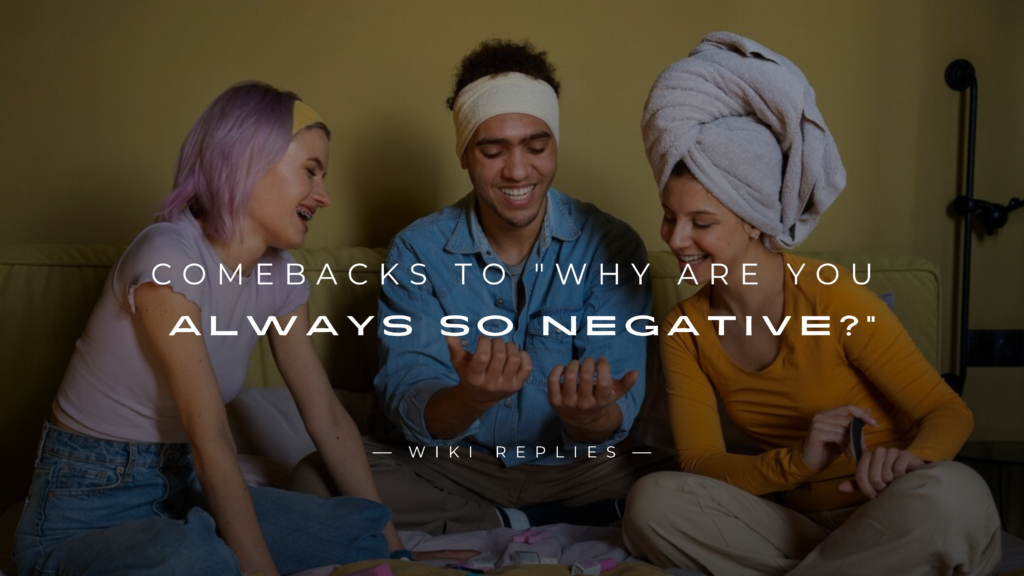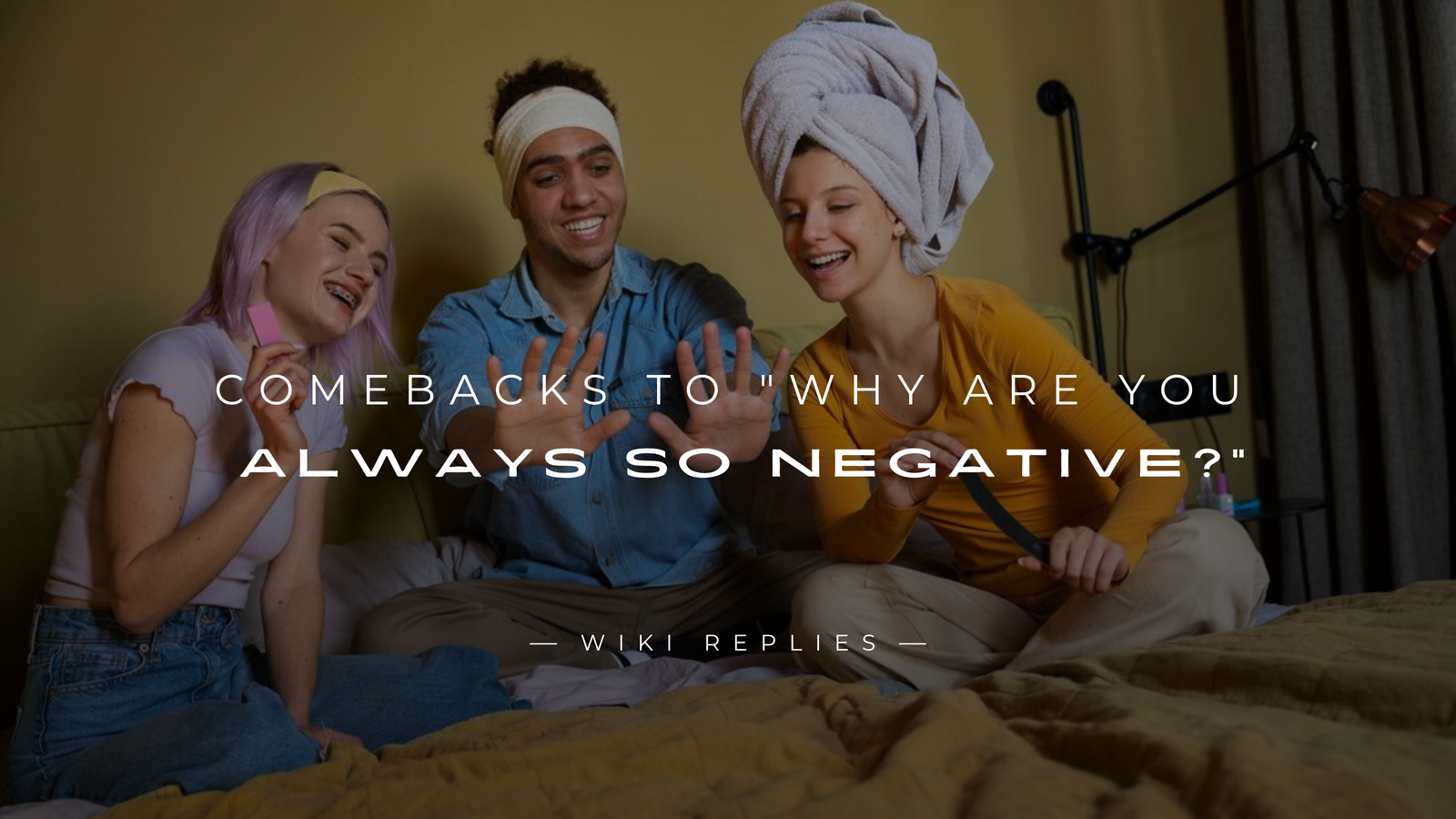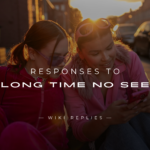Have you ever been in a conversation where, after sharing your honest thoughts or concerns, someone suddenly shoots you with: “Why are you always so negative?” It’s like getting a punch in the gut out of nowhere. You weren’t trying to be gloomy or bring anyone down; you were just being real. But now, you’re suddenly “the negative one,” and it feels unfair.
If you’ve been there and don’t know how to respond, you’re not alone. This article will help you understand what’s really behind that question and give you smart, respectful, and sometimes even witty comebacks to handle it like a pro.

220+ Comebacks to “Why are you always so negative?”
Witty/Sarcastic
- I’m just trying to provide the daily dose of reality no one asked for.
- I’m not negative—I’m just allergic to delusion.
- You say negative, I say highly entertaining.
- Would you prefer I lie with a smile?
- Someone’s gotta keep the optimism police in check.
- Oh, I’m sorry—was my realism interrupting your fantasy?
- I’m not negative. I just have a PhD in BS detection.
- Just filling the quota for inconvenient truths today.
- I tried being positive once. It was awful, 0/10, would not recommend.
- I’m not always negative. Just when I open my mouth.
Dry Humor
- Sorry, my filter’s still in the mail.
- Optimism ran out. Budget cuts.
- I only sound negative because I’ve met people.
- This is me being upbeat, actually.
- I moonlight as a pessimist for fun.
- Can’t help it—my spirit animal is a disappointed cat.
- Positivity broke up with me.
- I’m on a low-hope diet.
- Being this cheerful takes practice.
- I call it “deadpan with a side of truth.”
Self-Aware
- I know I can be, and I’m working on it.
- I notice that too—it’s something I reflect on often.
- Yeah, I tend to focus on what’s wrong. Trying to change that.
- I’ve been through a lot, and sometimes it shows.
- I know it’s not easy to hear—I’m still learning balance.
- I’m aware of it. Thanks for pointing it out kindly.
- Sometimes I vent more than I should.
- It’s not always how I want to come off, honestly.
- I’m trying to rewire the way I think, but it’s a process.
- You’re not wrong—thanks for being patient with me.
Playfully Defensive
- I’m not negative, I’m just energetically realistic.
- This is how I protect myself from disappointment—like a hedgehog.
- I’m actually the fun kind of negative.
- Not negative—just really passionate about what’s wrong.
- It’s not negativity, it’s… emotionally advanced forecasting.
- I have a talent for worst-case scenarios. Some call it a gift.
- I prefer to call it “selective enthusiasm.”
- If I were any more positive, I’d float away.
- I’m not negative, you’re just overly hopeful.
- Okay fine, I’m 90% sass, 10% doom.
Reverse Psychology
- Why are you always so bothered by honesty?
- Maybe you’re just not used to hearing the truth unfiltered.
- Would you rather I ignore what’s wrong just to keep you comfy?
- So now being observant is a crime?
- Maybe it says more about your comfort with discomfort.
- If I was always positive, would you accuse me of being fake?
- I must really be shaking things up for you to notice.
- Are you uncomfortable with real talk?
- Interesting—so naming problems is now negativity?
- Sometimes the truth just sounds harsh if you’ve been sheltered by optimism.
Psychological Insight
- Sometimes I fixate on problems because I feel out of control.
- It’s a coping mechanism—I analyze threats first.
- Negativity can be a symptom, not a personality flaw.
- I focus on flaws because I fear being caught off guard.
- It’s a way to manage anxiety, even if it doesn’t always help.
- My brain’s wired to spot danger—it’s survival, not spite.
- I get stuck in negative loops when I’m overwhelmed.
- Some of us process hope through caution.
- It’s not that I want to be negative—I just overthink everything.
- I see worst-case scenarios so I can brace myself emotionally.
Philosophical
- Without shadows, light has no meaning.
- I believe awareness of pain makes joy richer.
- Negativity is just honesty with a conscience.
- I question things to understand them, not to destroy them.
- I’m not negative—I’m reflective in a noisy world.
- Some of us search for truth, even if it’s ugly.
- I find meaning in facing the uncomfortable.
- What’s labeled negative might just be unspoken truth.
- Being hopeful without awareness is just denial.
- To critique the world is to care enough to want change.
Empathetic
- I know it can be hard to hear—it’s not meant to hurt.
- I’m sorry if I come off that way, it’s not my intention.
- I appreciate you noticing—it means you care.
- Sometimes I vent too much. Thanks for listening anyway.
- I’ve been feeling heavy lately, but I’m trying to stay open.
- Thank you for calling me in instead of pushing me away.
- I’ll work on expressing myself in a more balanced way.
- I know it’s draining to hear negativity all the time—I’ll check myself.
- You’re right—it’s something I want to improve.
- I might not always show it, but I’m grateful you’re still here.
Confrontational
- Why are you always so bothered by how I feel?
- Maybe ask yourself why you can’t handle uncomfortable truths.
- Funny how expressing a different perspective makes me “negative.”
- You don’t seem to ask that when I agree with you.
- Sounds like you’re more interested in silence than honesty.
- If my tone bothers you more than the issue, maybe rethink your priorities.
- Maybe because people keep asking passive-aggressive questions like that.
- I wouldn’t seem so negative if people actually listened.
- Just because I’m not sugarcoating things doesn’t make me the problem.
- If you want fake optimism, find someone else.
Stoic
- I simply observe things as they are.
- I don’t see it as negative—just realistic.
- Life isn’t always pleasant, and pretending won’t change that.
- Emotions don’t change facts.
- I try not to waste energy on forced positivity.
- I say what needs to be said, whether or not it’s pretty.
- What you call negativity, I call clarity.
- I’ve made peace with not sugarcoating the truth.
- I focus on what I can control, not how others label my mindset.
- I’m not here to entertain illusions—just to deal with reality.
Cynical Humor
- Oh, I’m sorry—I left my rose-colored glasses in the apocalypse.
- I’d be more positive, but reality keeps interrupting.
- My optimism died the same year Blockbuster did.
- Look, I’m not negative—I’m just pre-disappointed.
- If hope were a stock, I’d have sold it in 2008.
- This is what happens when you read the news.
- Positivity? In this economy?
- Life gave me lemons. I made sarcastic commentary.
- I’m just a realist with a dark sense of humor.
- I tried being optimistic once. Gravity still worked.
Redirection
- Instead of focusing on my tone, let’s look at what I’m actually saying.
- Can we talk about the issue instead of how I express it?
- Let’s focus on solving the problem, not criticizing the mood.
- What about what I said struck a nerve?
- Maybe there’s a reason I’m reacting this way—want to hear it?
- Is it negativity, or just honesty that feels uncomfortable?
- What do you think we can do about the issue I mentioned?
- Would you rather I not care at all?
- Let’s not get sidetracked by tone. What matters is the message.
- I think there’s more to discuss than just vibes.
Meta/Ironic
- Wow, that question sounds super positive.
- Ah, the classic “blame the tone, ignore the truth” move.
- How ironic—labeling me to avoid listening.
- Isn’t it funny how we label criticism as negativity?
- Nothing screams positivity like calling someone negative.
- That feels like a very upbeat way of shutting me down.
- This is the part where you villainize me for caring.
- Love how “constructive feedback” turns into “negativity” in 3 seconds.
- So this is the “positive vibes only” clause in effect?
- Cool, let me know when being real is allowed again.
Blunt
- Because life isn’t all sunshine, and I don’t pretend it is.
- I’m not here to make people feel better with lies.
- That’s just how I talk—deal with it or don’t.
- If you want sugarcoating, try a cupcake.
- I’m not negative. I’m honest. There’s a difference.
- I’m not here for performance positivity.
- Don’t confuse discomfort with disrespect.
- The truth doesn’t always sound nice.
- Not everyone processes things with glitter and a smile.
- Better to be blunt than fake.
Lighthearted
- Me? Negative? Nah, I’m just spice in a bland world.
- I’m just giving the universe some sass.
- If I were too positive, you’d think I was possessed.
- I’m just seasoning the conversation with a little sarcasm.
- You wouldn’t love me if I were boring and cheerful.
- It’s my signature vibe—like salty but stylish.
- I’m the realist friend, every group needs one.
- I balance out the sunshine crew.
- Hey, someone’s gotta say what we’re all thinking.
- I’m basically a weather forecast: occasionally stormy, always accurate.
Pop Culture Reference
- Call me Wednesday Addams—I thrive in darkness.
- I’m just channeling my inner Squidward.
- This is my villain origin story.
- Think of me as the Batman of emotional commentary.
- I’m not negative—I’m just stuck in a “The Office” episode.
- This is how I’d survive in The Hunger Games.
- I’ve got the sass of Iron Man and the gloom of Snape.
- If I were any more cheerful, I’d be Buddy the Elf—and that’s terrifying.
- My energy is pure “resting grump” à la Ron Swanson.
- I’m just out here giving off Eeyore vibes with Deadpool commentary.
Therapeutic Insight
- Sometimes I focus on the negative because that’s what I was trained to look for growing up.
- I get caught in negative thinking when I’m overwhelmed—it’s a pattern I’m trying to break.
- It’s not about being negative—it’s about feeling unheard and trying to protect myself.
- I’ve been through a lot, and sometimes my thoughts default to caution.
- Expressing the negative helps me process it instead of holding it in.
- It’s hard to stay optimistic when anxiety is always running in the background.
- I know it comes off that way, but it’s often just fear in disguise.
- I’m more negative when I feel disconnected or unsupported.
- Talking through what’s wrong is how I make sense of things—it helps me cope.
- I’m working on being more balanced, but it takes time to rewire old habits.
Intellectual
- What you’re calling negativity might actually be critical thinking.
- I think deeply about things, and sometimes that includes problems others overlook.
- Being honest about flaws is essential for growth—both personal and societal.
- I value truth more than comfort, and sometimes that looks like negativity.
- Pointing out what’s wrong isn’t pessimism—it’s intellectual responsibility.
- I prefer nuance over blind optimism.
- I question things because I believe everything deserves scrutiny.
- It’s not negativity—it’s emotional and analytical depth.
- A critical mind doesn’t always sound cheerful, but it’s necessary.
- If we don’t acknowledge the cracks, how can we build anything that lasts?
Mock Enthusiasm
- OMG, I had no idea! Thanks for the life-changing observation!
- Wow! You’re so right! I should totally just be super fake all the time!
- Yay, let’s all pretend everything’s perfect forever!
- Oh no! My sarcasm meter must be broken again!
- Wait, am I not radiating toxic positivity like I’m supposed to?
- My bad—I forgot we were in the land of unicorns and sunshine!
- You caught me! I’ve been running a secret negativity campaign.
- Oh no! I’ve failed the Good Vibes Only cult!
- How dare I interrupt the eternal parade of smiles!
- I’ll try to bottle my existential dread in sparkles next time.
Dismissive
- Cool. Noted. Moving on.
- Yeah, I’ve heard that one before.
- Thanks for the feedback—I’ll file it under “unsolicited.”
- And yet, here we are, still talking.
- I’m not here to win the positivity contest.
- Not really in the mood for a personality critique today.
- Great. Add it to the list.
- Let me know when we’re done pretending.
- I’m not changing for someone who can’t handle honesty.
- You don’t have to like it, but it’s still true.
Strategic
- Sometimes I highlight problems so we can actually fix them.
- I focus on what’s wrong so we don’t get blindsided later.
- It may sound negative, but it’s how I manage risk.
- I’d rather sound harsh now than clean up a disaster later.
- Calling it out early saves us pain down the line.
- I use criticism to improve things, not destroy them.
- I’m not trying to be a downer—I’m trying to prevent mistakes.
- I focus on the gaps so we can build something stronger.
- My tone might be blunt, but my intention is to protect.
- I question things now so we don’t regret ignoring them later.
Grateful (but firm)
- I appreciate you saying that—it helps me reflect, even if I disagree.
- Thank you for bringing it up. I’ll think about it, but this is part of how I process.
- I hear you, and I’m trying to find a better balance.
- I know it’s hard to hear sometimes, and I’m working on how I express things.
- Thanks for pointing that out, but please understand there’s more behind it than just “being negative.”
- I get where you’re coming from, and I’m open to feedback, but I won’t fake positivity to make others comfortable.
- I’m grateful for your honesty, and I hope you’ll give me space to be honest too.
- I appreciate you noticing—it means you care. Just know I’m not trying to bring anyone down.
- Thanks for looking out for me. I’m trying to speak up without spiraling into negativity.
- I value our connection, and I’m always working on how I show up—even when I’m struggling.
Why This Statement Stings
Being called negative isn’t just a simple comment—it’s an identity judgment. It can make you feel like your whole personality is being dismissed. Suddenly, you’re questioning yourself: “Am I really negative? Should I stop sharing my true thoughts?”
But here’s the truth: what people often call negativity is just honesty, caution, or healthy skepticism. Being realistic doesn’t mean you’re a downer. The world actually needs people who can see things clearly and point out what others might miss.
The Psychology Behind the Accusation
Why do people label someone as negative?
- Avoiding discomfort: Most people don’t like hearing things that challenge their ideas or hopes. When you point out a problem, they might get defensive and prefer to label you as negative rather than listen.
- Shifting focus: Calling you negative moves the attention from the topic to your character. It’s easier for them to attack you than face an uncomfortable truth.
- Projection: Sometimes, the person who calls you negative is feeling stressed or overwhelmed themselves. Instead of admitting it, they put that feeling onto you.
So, usually, it’s not really about you.
Ask Yourself: Is This True or Just Convenient?
Before reacting, pause and think:
- Were you actually harsh or just honest?
- Have you been feeling down lately?
- Or are you around people who only want to hear positive things?
Self-awareness is great, but don’t let someone else’s discomfort define your self-worth.
When Should You Respond and When Should You Let It Go?
It’s important to pick your battles.
- Respond if: It’s someone close who keeps making this comment or if it hurts your self-esteem.
- Let it go if: It’s a stranger, a one-off comment, or you’re too tired to argue.
Remember, sometimes silence is the best and strongest reply.
Smart Comebacks to “Why Are You Always So Negative?”
When you want to respond, here are some choices depending on your mood:
Calm and Respectful
- “I prefer to focus on reality, not just the bright side.”
- “I’m just being honest about how I feel.”
- “Seeing things differently doesn’t mean I’m negative.”
Witty and Light-Hearted
- “I’m not negative; I’m allergic to fake optimism.”
- “Guess I’m the group’s reality check!”
Bold and Assertive
- “Why does honesty make you uncomfortable?”
- “Labeling me doesn’t solve anything. Want to have a real conversation?”
What to Do When It Happens Again and Again
If the same person constantly calls you negative, don’t let it get inside your head.
- Remind yourself your feelings are valid.
- Set emotional boundaries by telling them how their words affect you.
- If they don’t respect you, it’s okay to distance yourself for your own peace.
Improving Communication (If You Want To)
Sometimes, tweaking how you say things helps others understand you better without changing who you are.
- Start with positives before criticism (“I like this idea, but maybe we should think about…”).
- Ask questions instead of giving commands (“What do you think about the risks?”).
- Pay attention to your tone—being gentle can help your message land better.
Turn Criticism Into a Superpower
Being able to spot problems before they happen is a huge strength. You’re not negative, you’re insightful. The world needs people who see the full picture, not just the shiny parts.
Conclusion
Dealing with comments about negativity can be tricky, but having the right comeback at your fingertips can help you respond with confidence and even a touch of humor. Whether you want to lighten the mood or stand your ground, these 220+ best comebacks give you plenty of options to choose from. If you enjoyed these, you might also find our 220+ Best Comebacks to “You’re Being Ridiculous” just as handy for those moments when you need a quick and clever reply.
FAQs
Q. Why do people say “Why are you always so negative?”
Usually because they feel uncomfortable or defensive. It’s easier for them to label you than to face difficult truths.
Q. Is being called negative always bad?
No. Sometimes it just means you’re honest and realistic. The key is how you communicate and whether you’re constructive.
Q. How can I change how people see me without changing who I am?
Try softening your tone, adding empathy, and asking questions instead of giving critiques.
Q. What if I do tend to be negative a lot?
Check in with yourself. Are you stressed or overwhelmed? It’s okay to feel that way—try to find balance and support.
Q. Should I distance myself from people who call me negative repeatedly?
If it’s hurtful and constant, yes. Protecting your mental health is important.










